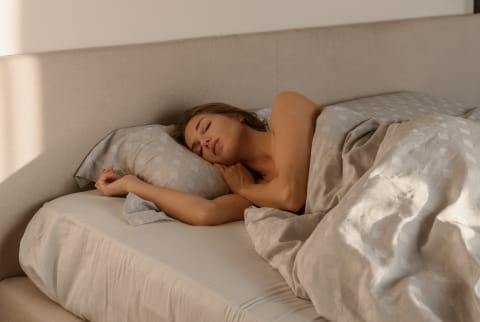Advertisement
This Supplement Increased My Nightly REM Sleep By Over 400%


From the moment my sunrise alarm clock lights up until the time I start my nightly skin care routine, my day is nonstop. I depend on a good night's sleep for restoration and recovery. So, when my Oura ring tipped me off that I wasn't getting enough REM (rapid eye movement) sleep, I knew I had to make some changes.
What is REM sleep, and how much do you need?
You already know high-quality rest is crucial, but have you considered the significance of each specific sleep stage? Oura's sleep data breaks down your night into light sleep, deep sleep, REM sleep, and latency (how long it takes you to fall asleep), with every stage serving a distinctive purpose.
REM sleep happens in cycles throughout the night, and researchers believe1 this is a time when your brain recharges and memories are formed and consolidated2.
The amount of time you spend in REM sleep decreases as you age, with babies spending up to 50% of their sleep in REM, and adults averaging about 20 to 25% of the night in this stage.
As an adult who sleeps for eight to nine hours each night, my REM cycle should ideally be one hour and 45 minutes at a minimum—so imagine my surprise when I found out I was only spending an average of 18 minutes in REM each night (about 4% of my total sleep).
I was clocking a sufficient amount of deep and light sleep, so I wasn't waking up feeling groggy or tired. I have, however, experienced an increased amount of brain fogginess over the past few years—and any of my friends would tell you my memory is not great.
Discovering my low REM score validated that my cognitive performance really was subpar. If I was only sleeping a few minutes in REM, how was my brain supposed to recharge? Thankfully, it also showed me that there was something that could be done about it.
My quest for more REM
The first order of business for restoring my REM sleep was timing my meals differently so I wouldn't be going to bed on a full stomach. Unfortunately, my REM cycle landed in the same general ballpark. I tried different brands of hemp CBD (which tends to improve my sleep), but no significant changes in my REM. I even gave in to supplements with melatonin, and I didn't notice a difference in sleep quality (but I did wake up groggy).
One night, I remembered I had a bottle of mindbodygreen's sleep support+ supplement that I'd first bought when I was having frequent wake-ups throughout the night. Once I got to the root of that problem, however, I stopped taking the supplement, not knowing that it was likely helping in other ways I hadn't yet noticed.
sleep support+ is a nightly sleep aid made with magnesium, jujube, and PharmaGABA®. Unlike other sleep supplements I had tried, sleep support+ is nonhormonal and does not have melatonin, which was music to my ears after that unwanted grogginess. I already knew mindbodygreen's sleep support+ supplement helped me stay asleep throughout the night in the past, but I had no idea that it would impact the specific REM sleep stage the way it did.*
My experience with sleep support+
In another effort to see if REM sleep could ever be in the cards for me, I took two capsules of sleep support+ about an hour and a half before bedtime. When I eagerly checked my Oura app the next morning, I found my REM sleep at one hour and 23 minutes (18% of my total sleep)—over four times more than what I was previously clocking!*
After weeks of not getting more than 20 minutes of REM sleep in one night, it was wild to see my score go up so dramatically. While you can't argue with those numbers, I'm a bit of a skeptic. I racked my brain for anything else that could have contributed to this sudden influx of REM, and I was determined to find out if it was just a fluke.
After taking two more capsules the next night, my Oura app showed an hour and seven minutes in the REM cycle. That was the last of the bottle, and the next morning my REM sleep duration went right back down to 16 minutes. I immediately restocked my sleep support+ supply and continued putting it to the test. Over the course of two weeks of taking sleep support+, my average time spent in REM sleep went from 4% to 19% of the night.* I've even been remembering my dreams, which I rarely had in the past few years.
With no other notable changes in my routine to credit, the skeptic in me concedes.
The takeaway
I depend on quality sleep for my productivity, mood, and overall physical and mental well-being. Until recently, I thought simply clocking eight hours was enough. As it turns out, sleep is not one-size-fits-all. Diving deeper into my data with the Oura ring has shown me the importance of each sleep stage and how quality sleep matters just as much as total quantity.
After a few weeks of using mindbodygreen's sleep support+ to increase my time spent in REM, I've noticed significantly better cognition—and I might even be slightly less forgetful (but it depends who you're asking).* Needless to say, I won't be letting my sleep support+ supply run out again any time soon.
